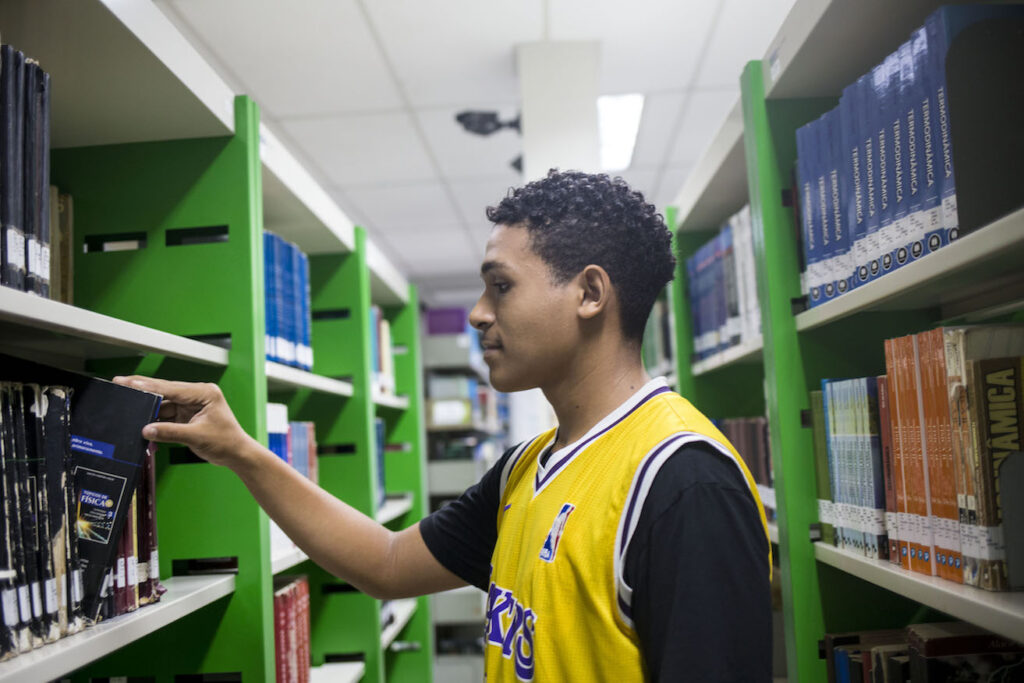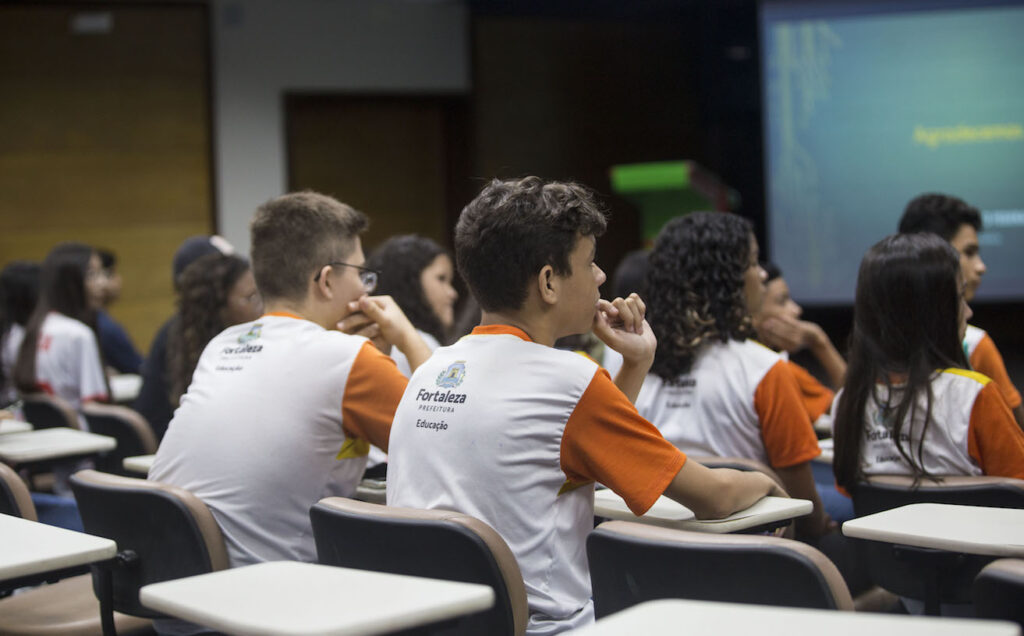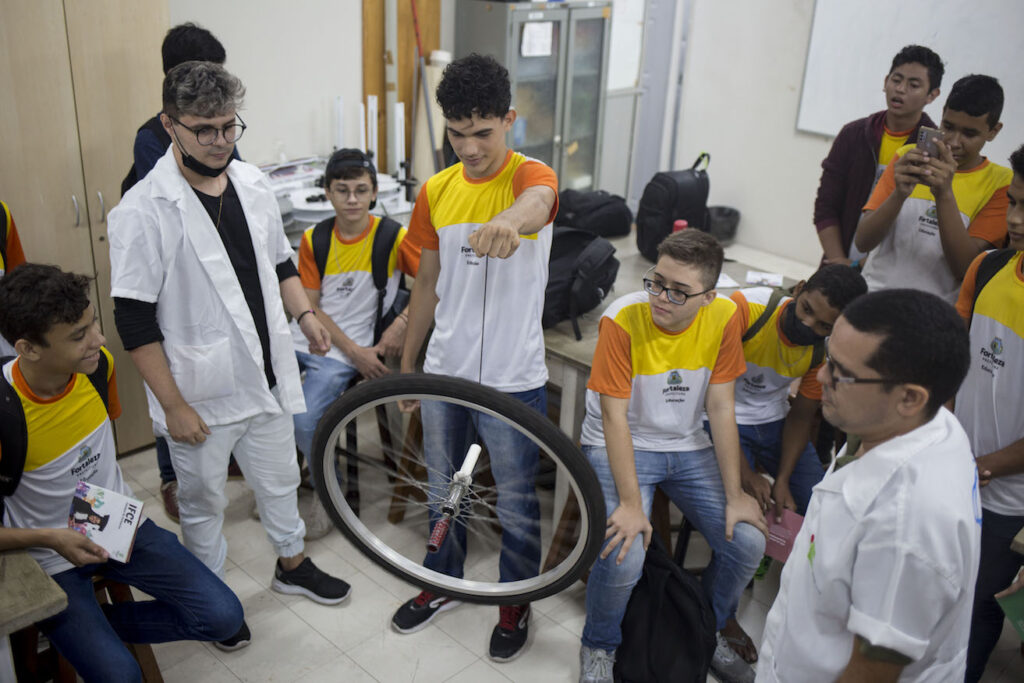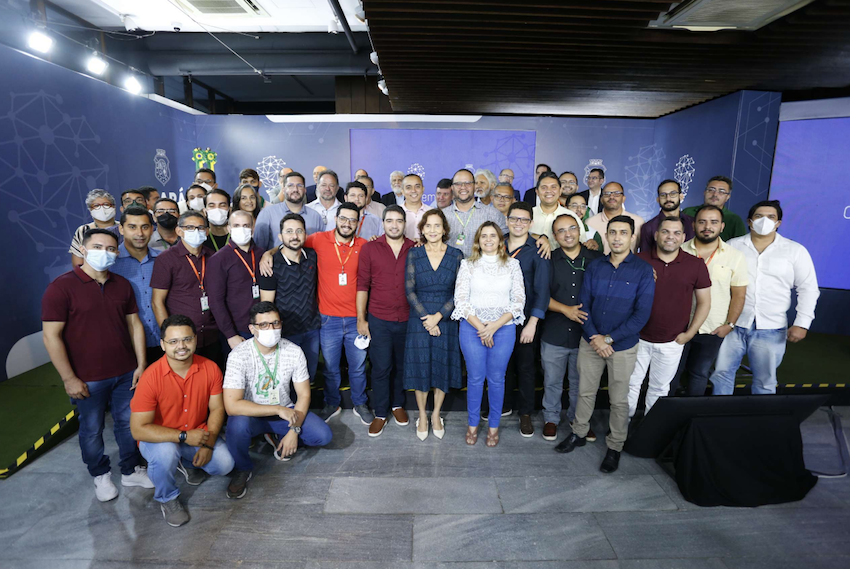Education and Training: A quality model for Brazil

Ceará is a reference in Brazil when the subject is education. The state has 18 municipalities among the 20 Brazilian cities with the highest scores in the Brazilian Education Opportunity Index, the Ioeb 2021. This index shows the educational development conditions of children and young people. It encompasses data from Kindergarten to High School from all the educational networks in the municipality: state, municipal, and private. It is a biennial public index that analyzes and compares how each municipality, state, Federal District, and Brazil as a whole, is contributing to the educational success of its citizens.
To compose the model, the relationship between three factors was observed: educational outcome indicators, educational input and process indicators, and also family background control. The first factor refers to the results of the Basic Education Development Index (IDEB) of the early and final years of elementary school and the net enrollment rate in high school. The second is related to the qualifications of teachers, the average number of class hours per day, the experience of principals, and the attendance rate in kindergarten. And the third considers the average education level of the parents.
Sobral and Cruz tied for 1st place in the national ranking, which covered 5,126 municipalities throughout Brazil. With a score of 5.5, Ceará also won the first position in the Ioeb among the northeastern states. In the national average, it appears in 2nd place in Brazil, behind only São Paulo. In the ranking of capitals, Fortaleza appears in 3rd place, tying with Curitiba, ahead of the cities of São Paulo and Teresina. The municipalities of Milhã, Ararendá, Itatira, Jijoca de Jericoacoara, Pires Ferreira, Martinópole and Quixeramobim also achieved national prominence in Ceará, which are between 3rd and 10th overall.
The Ioeb is carried out by the Cedac Educational Community, with the technical partnership of the Metas Sociais and Knowledge Social consultancy. The initiative has the support of Itaú Social, Instituto Natura, Fundação Roberto Marinho and Instituto Humanize and institutional support from CLP.
Higher Education
The Government of Ceará aims, in the area of Higher Education, at an inclusive and high-quality supply all over Ceará, valuing teachers and employees, and strengthening the universities.
Ceará already has seven universities (three state, three federal and one private), as well as the Federal Institute of Ceará. The State University of Ceará (Uece), the State University Vale do Acaraú (UVA) and the Regional University of Cariri (Urca) are part of the higher education institutions under state responsibility and linked to the Secretary of Science, Technology and Higher Education (Secitece).
In the Federal sphere, the Federal Institute of Education, Science and Technology of Ceará (IFCE) headquartered in Fortaleza, stands out. The institution was created under Law. N º 11.892, of December 29, 2008, through the integration of the Federal Center of Technological Education of Ceará with the Federal Agrotechnical Schools of Crato and Iguatu. Linked to the Ministry of Education, it is an autarchy of legal nature, with administrative, patrimonial, financial, didactic-pedagogical, and disciplinary autonomy, equal to the federal universities. It has a strong presence in the research and extension areas, with a special focus on the technical and technological areas. Besides Fortaleza, it is present in 34 other cities in Ceará.
Expansion of Higher Education
Ceará will have seven new headquarters for the three state universities in the interior, jumping from 16 to 23 municipalities, a 44% increase in the availability of state higher education, the largest expansion in state public higher education in history. In addition, new courses are being created for five existing campuses, such as Medicine in Crateús, Quixeramobim and Crato, as well as Agronomy in São Benedito. Another highlight of the announcement was the confirmation of 693 vacancies in a public contest for permanent teachers.
These actions are part of the State of Ceará Higher Education Expansion Policy created to guarantee the insertion of young people from Ceará in a higher education course that meets the demands of qualified professionals to promote local development, observing the vocation of each region. The state network of higher education in Ceará has around 40,000 students enrolled.
Largest scientific production in history
Scientific production in Ceará had, in 2020, a growth of 16.7% in the number of scientific articles publications in international English-language journals compared to 2019. In all of Brazil, the growth of this type of publication was only 5 ,1%. The information is from the Web of Science, a non-profit organization that catalogs and tracks the production of researchers around the world.
All Ceará universities have increased their scientific production in the last five years. The highlight is for state public universities: the Regional University of Cariri (Urca) increased by 79%, the State University of Ceará (Uece) grew by 26.5% and the State University Vale do Acaraú (UVA) maintained stability in the number of international publications.
The Ceará Foundation for Development Support (Funcap), an agency linked to Secitece, is mentioned in the study as financing 9% of the published articles. In 2020, the scholarships offered by the institution showed growth in the master's degree (from 594 to 611) and in doctoral degrees (from 464 to 473).
Funcap develops the Research Productivity Scholarship Program, Stimulation of Internalization and Technological Innovation (BPI). The initiative aims to grant scholarships and grants to researchers with a doctorate and a link to Higher Education Institutions and/or research in cities in the interior of Ceará, to encourage the establishment of these professionals in the regions and encourage the increase of scientific, technological and innovation in areas outside the Metropolitan Region of Fortaleza. The last public notice, launched in 2020, invested 6.4 million Reals (about US$1.2 million) in the program.
Investment in research scholarships, scientific initiation and student permanence
The Government of Ceará is investing 92 million Reals (about 17.3 million dollars) in academic training and research to guarantee 2,054 scholarships, through a partnership with Secitece and Funcap. The initiative boosts scientific development and supports researchers from Ceará. The offer attends public and private higher education institutions, as well as research units.
Students in vulnerable situations can also count on financial support for their permanence in the university. Through the University Permanence Scholarship Program, the Government of Ceará, through Secitece, has allocated around 10 million Reals (about 1.88 million dollars) annually for student assistance actions in the three state universities (UVA, Uece and Urca), paid with resources from the State Fund for the Fight against Poverty (Fecop).

To enable students to have adequate internet access to attend classes and other remote activities, Secitece invested 1 million Reals (about 188 thousand dollars) to buy more than 10.5 thousand chips delivered to undergraduate students at Uece, UVA, Urca and the Faculties of Technology (Fatecs).
Uece: Ceará University Hospital
The new Ceará University Hospital is being built on the Uece campus, in the Itaperi district of Fortaleza, and will occupy an area of 79.5 thousand m2. HUC represents an important reinforcement in the offer of services to the population, together with the training of new professionals, aiming at valuing health, public education, and science.
HUC will be the largest hospital in the state and will have 654 inpatient beds, distributed over three towers (clinical, surgical, and maternal and child), seven floors, and a heliport. The construction work is expected to be concluded in 2022.
See here the information about the Ceará Health Chain.
Araripe Geopark: the first in the Americas
Linked to Secitece and Urca, the Araripe Geopark, recognized as the first geopark in the Americas by the United Nations Educational, Scientific and Cultural Organization (Unesco) is located in the south of the State of Ceará, covering the municipalities of Barbalha, Crato, Juazeiro do Norte, Missão Velha, Nova Olinda and Santana do Cariri. From 2015 to 2021, Secitece invested around 1.4 million Reals (about US$264,000) in the area of Paleontology in Cariri.
In 2021, more than 300 fossils seized in a Federal Police operation were passed on to Urca. The material is under the protection of the Plácido Cidade Nuvens Museum of Paleontology and available for scientific research. In the same year, 35 pieces from the University of Kansas, in the United States, were also returned to the Museum, including a fossil of the Cretapalpusvittari spider, the oldest recorded in all of South America, dating from the Mesozoic Era, between 250 and 65 million years ago.
Araripe Geopark received reinforcement in its research area. In April 2022, 11 visiting researchers arrived in Cariri to strengthen and consolidate the actions of the Plácido Cidade Nuvens Museum of Paleontology, tripling the number of scientists working at the institution.
Distance Education: Open University
Ceará ended the year 2021 with 39 support centers of the Open University of Brazil (UAB), installed in 37 cities and serving the 184 municipalities of Ceará. The UAB is responsible for distance higher education, with the main offer of courses aimed at elementary school teachers and has been operating in Ceará for 15 years.
The Open University of Ceará (UACE) will guarantee the continuity of the state’s distance education, benefiting students from municipalities with a low HDI and in vulnerable situations, providing access to higher education. For its implementation, about 480 thousand Reals (about 90 thousand dollars) will be invested, by the State Fund for the Fight against Poverty (Fecop). Higher, technological and technical courses will be offered, as well as extension and research activities for the people of Ceará.
Qualification is also a priority
Promoting professional education for the world of work. This is the goal of the Qualifica Ceará actions, a Secitece program that targets the initial and continued qualification of the population of Ceará. The initiatives also benefit thousands of people at risk and socially vulnerable by promoting courses and workshops in various areas of knowledge.

These are its main actions
-UTD: Professional Qualification and Digital Inclusion: With courses ranging from basic training to more advanced levels, the University of Digital Work (UTD) provides free training in Information Technology and Communication to improve professional qualification in strategic areas, promoting the development of the state and facilitating the insertion of new professionals in the labor market. Since its creation in 2012, more than 10,000 people have been certified and almost 700 classes have been opened. Among the most popular courses are Graphic Design, Basic Computing, Computing for the Job Market, Introduction to Programming, Programming Language (Java and PHP), Computer Support and Maintenance, Computer Networks, and Web Design.
-CVTs and CVTecs: initial and continuing education courses for workers: More than 3 million Reals (about 566 thousand dollars) were applied, through a parliamentary amendment, to restructure the Technological Vocational Centers (CVTs), units that offer Initial and Continuing Education Courses for workers in several areas. There are 30 CVTs spread throughout the 14 macro-regions of Ceará, qualifying more than 66 thousand people in more than 3,450 courses. The restructuring work of the CVTs was carried out by Secitece, with the support of the Ministry of Science, Technology and Innovations (MCTI) and included the delivery of new vocational laboratories in the areas of Agribusiness, Industry and Commerce and Services, including equipment for welding, motorcycle maintenance, design and fashion, building maintenance, refrigeration and air conditioning, workplace safety, CAD, food processing and computer maintenance. The Technical Vocational Centers (CVTECs) located in Barbalha, Crato and São Gonçalo do Amarante promote technical professional education courses in areas such as agriculture, gastronomy, metallurgy, environment, and electromechanics. They also promote technological extension, with courses for workers and assistance to producers.
C-Jovem Program

C-Jovem training program for public school students aims to train 100,000 students over the next five years, focusing on the development of technologies, such as 5G Infrastructure, Android Development and Cloud Computing.
The action, of a multi-institutional nature, arises from the need for professionals for the Information and Communication Technology (ICT) sector in Brazil and also in view of the understandings with the sector for the development of Ceará. It is the result of a joint proposal by the Government of Ceará, through the Education Departments (Seduc); of Economic Development and Work (Sedet); Science, Technology and Higher Education (Secitece); and Planning and Management (Seplag), through the Information Technology Company of Ceará (Etice).
The pilot project began with the implementation of the program in the state public school system and so far, has trained around 200 teachers, who are passing on their knowledge to 4,358 students in technical courses on topics such as Computer Networks and Computing Science in 109 State Vocational Education Schools.
It works through action cells, where each one is composed of a coordinator who supports young tutors from higher education. These, in turn, support high school students. The program will be implemented through an extension project of Higher Education Institutions and will last for one year, including an immersion period in partner companies so that the student can use the knowledge in practice.
The objectives of the C-Jovem Program are to achieve results with the retention of talent by increasing the quality of employment and entrepreneurship opportunities; improving the offer of ICT professionals, in quantity and in curricular training, in a way linked to the demand of a strategic sector for the country; to include young people in collaborative entrepreneurship and socioeconomic development policies; and strengthening the government-academy-business partnership, all aligned to contribute to the strengthening of entrepreneurship and innovation.
See here for more information about the technology hub of Ceará
Technology Faculties (Faetec)
The Technology Faculties (Fatecs) in Juazeiro do Norte and Quixeramobim offer courses for the training of mid-level technicians, higher-level technologists and latu sensu postgraduate courses for residents of Cariri and the Sertão Central. Among the highlights, the reopening of entrance exams and the selection process of Fatecs' Middle Level Technical courses and the renewal of accreditation of teaching units, in addition to the renewal of recognition of the courses by the State Council of Education and MEC. The two Fatecs also began to provide meals to full-time students and scholarship holders. The new Robotics laboratory was implemented at Fatec Cariri and the new Milk Analysis Laboratory was also inaugurated at Fatec Sertão Central, which improves the quality of this product throughout the region.
CTTC: Professionals of Excellence for Pecém
The Ceará Worker Training Center (CTTC), located in Caucaia, Metropolitan Region of Fortaleza, is one of the main instruments to promote professional training of excellence in strategic areas of the State.
In the complex, several courses are offered in metal mechanics, civil construction, transport and logistics and petrochemicals, enabling the initial and continuous training of around 1,200 people per year, benefiting workers from the cities of São Gonçalo do Amarante, Caucaia, Paracuru, Maracanaú , Maranguape, Paraipaba, Pentecoste and Fortaleza, among others.
For the operation of the CTTC, ceded to the Federal Institute of Education, Science and Technology of Ceará (IFCE), resources in the order of 33 million Reals (about 6.22 million dollars) were invested in works and equipment.
CTTC also has a 400kWp Solar Photovoltaic Mini-Generation Plant. The resources for the construction of the plant amount to almost 1.3 million Reals and were obtained through an agreement signed between the Government of Ceará/Secitece and the MCTI. The installation of the equipment is the first stage of a project that foresees the creation of the Renewable Energy Complex at CTTC Pecém and which will also include a laboratory. In all, 6 million Reals (about, 1.1 million dollars) will be allocated to the project, as a result of the agreement.
Multimedia
Radio: Ermerson Silva, Innovation leader of UniFAP’s Garagem Lab
Live: Carlos Décimo, Secretary of Science, Technology and Higher Education of Ceará (Secitece), and Wally Menezes, Rector of IFCE
Live: Açucena Gois, CEO and founder of IDSoft, and Igor Pontes, CEO and co-founder of Pesse LogTech
Podcast: Kennedy Montenegro, Executive Secretary of Labor and Entrepreneurship
Podcast: Hidelbrando Soares, rector of the State University of Ceará


